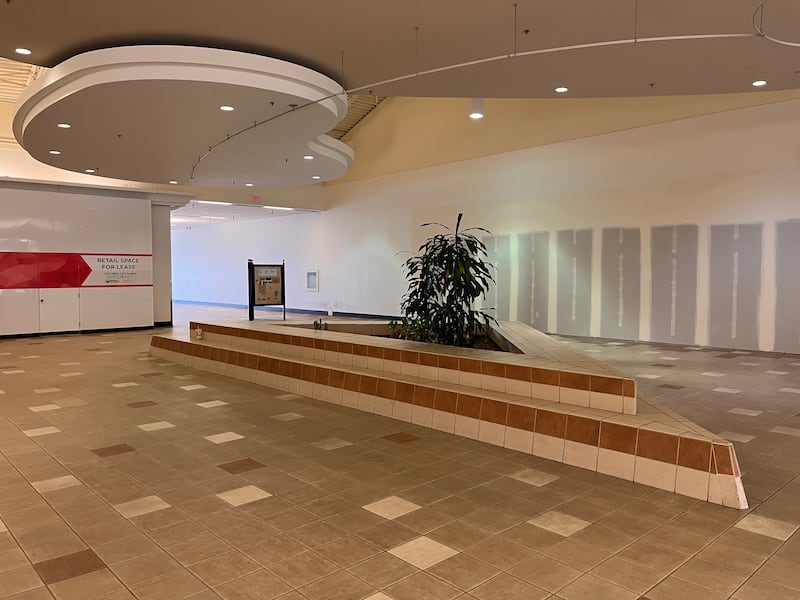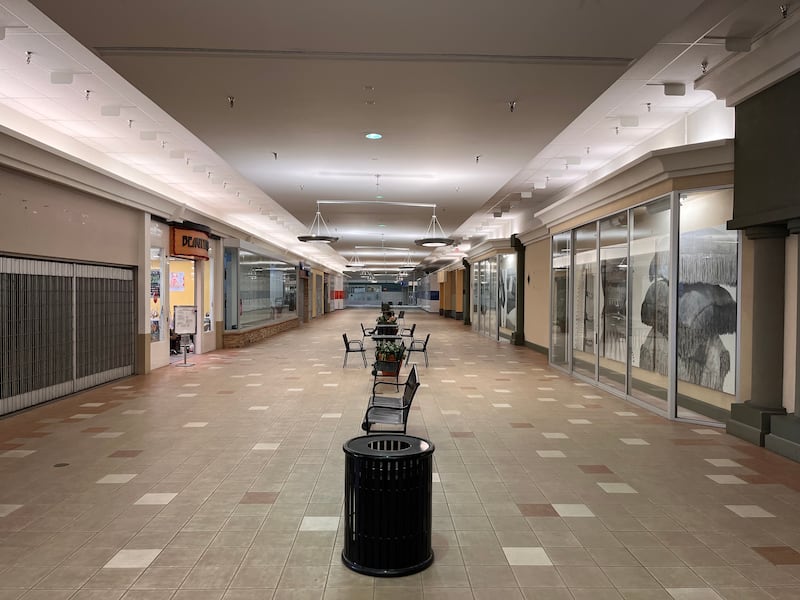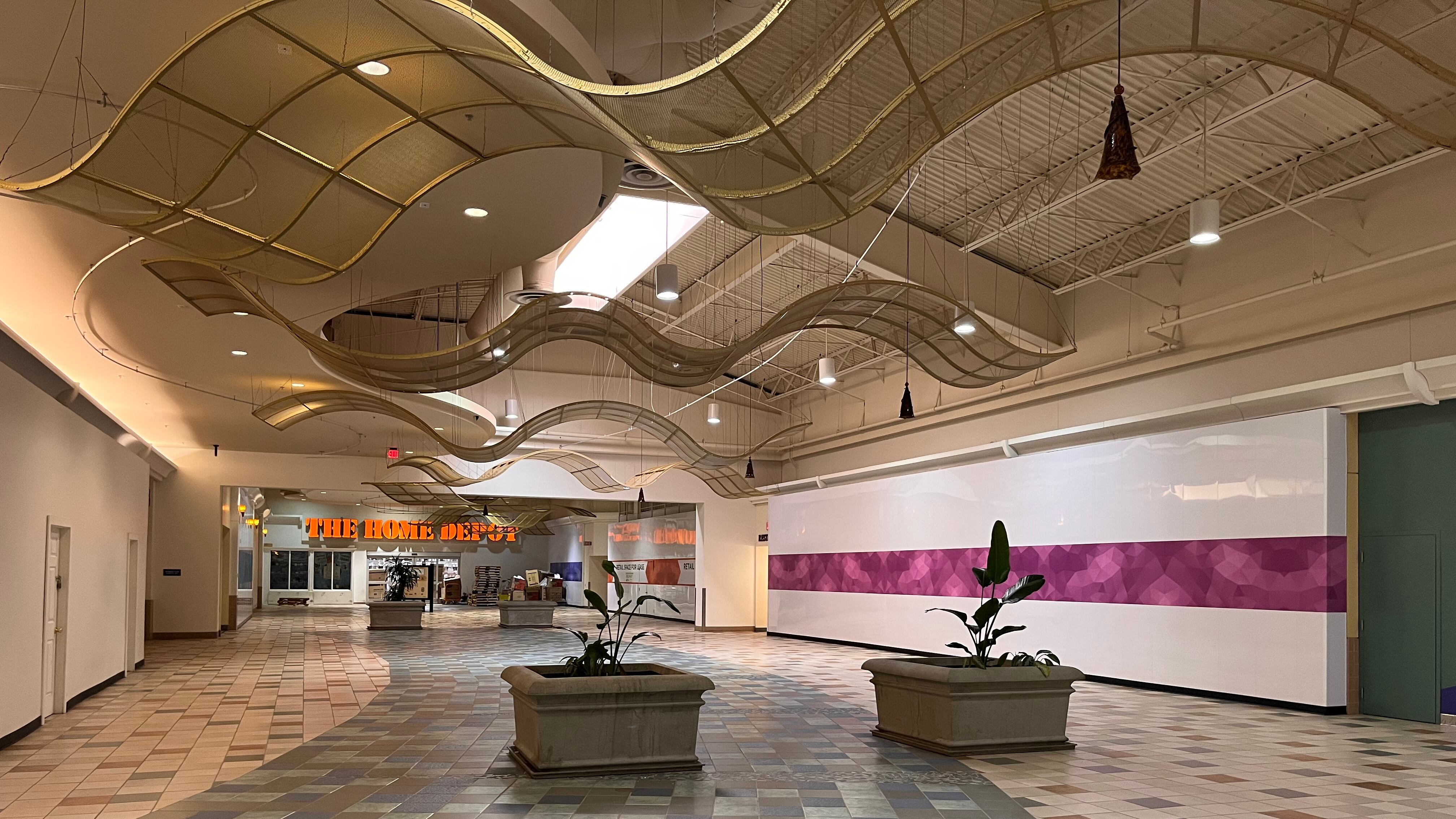Mark Benthimer can spot a disappearing act.
The owner of All-American Magic has endured no end of developer smoke and misdirection to sustain Portland’s last trick shop and longest-running magic show. He’d brought both to Mall 205 in 2011, after discovering that his store and stage at Jantzen Beach Super Center were scheduled for imminent demolition alongside the rest of the legendary entertainment hub.
At the start of this year, Rhino Investment Group purchased the quietly renamed Marketplace 205 for $43 million while explaining that the recent departure of Bed Bath & Beyond lent the larger property “an exciting repositioning opportunity.” Benthimer reached out to one of the owners with questions about the mall’s future.
“The next morning,” he laughs, “there’s an email saying I had two weeks to leave.”
Benthimer and the handful of small local businesses remaining were eventually given until the end of March to relocate.
Foot traffic had all but died out within the mall after Target and Home Depot closed interior entrances to combat theft. Those two big boxes will continue to operate unchanged while the space inside will be divided between two new tenants—rumored to be Hobby Lobby and Burlington Coat Factory.
Mall 205′s last day as a mall is March 31.
“They ended up giving me till the end of the month, but after 11 years, you’d like a little more warning,” Benthimer says. “I guess this is all legal. It sure is crappy, I’ll tell you that.”
Rhino Investment Group did not respond to inquiries from WW.

In a sense, it’s surprising the place lasted so long. Air conditioning was the only advantage Mall 205 held over Lloyd Center. Once Clackamas Town Center opened, it was just a matter of time.
Still, unlike so many ’70s-era relics of consumerist folly, this mall isn’t quite dead. At some point this week, when the last vendor turns out the lights, the new Marketplace 205 becomes something else: more retail hybrid than a big-box superstore, but no longer fitting what a mall used to mean.
To be fair, the history of Mall 205 has been little more than crappy owners making crappy decisions over 51 crappy years—longer, even, if you include the acreage beneath.
(In 1964, just five years before ground was broken on what would become 430,000 square feet of retail space, the expansive plot housed the West Coast’s largest private sanitarium—a de facto work farm awarded lavish federal subsidies with negligible oversight to serve as designated treatment facility for some 5,000 Alaskan residents deemed mentally ill.)
Taking its name from a planned interchange between the just-completed Banfield Expressway and ill-fated Mount Hood Freeway, the climate-controlled Mall 205 forged an identity (and brutalist-Levittown visual aesthetic) catering to the city that probably would have taken shape from a massive artery paving over old Portland to ease suburban commutes.
By the time COVID devastated all aspects of the industry, Mall 205 may well have been past saving, with only a handful of local storefronts remaining when the new owners pulled the plug.
“It was a dead mall,” admits Moustapha Gueye, who runs a kiosk called Demba. “Back when Target was opening their doors so people could walk inside, we had a little traffic, but not anymore. The DMV brings in their 200 people a day, and that’s it.”
Best known around town for hawking leather goods and NBA and NFL memorabilia at Saturday Market most every weekend for more than a decade, Gueye spends each summer setting up shop at state fairs across the Northwest for what he considers his primary business. Gueye had taken out a kiosk inside Mall 205 six years ago as means of combatting off-season restlessness and seemed to view the enterprise as equal parts storage facility and fraternal lodge.
“For some reason, the people that used to own the building sold to another company who told us we have only a month to get the hell out of here,” Gueye continued. “I didn’t actually even see the notice until Mark called. And then the nail shop didn’t know until the day after that because I had to tell them to check their email. The shoe guy next door was gone on vacation with his wife, and I guess he’s just gone now. Thank God for Lloyd Center.”
For Benthime and Gueye, the expulsion is the unwanted start of another journey. Their next destination? Another mall—one that many people have already written off for dead.
Just days after his retail world appeared to be crumbling without repair, Benthimer pulled an ideal relocation target out of his hat. All-American Magic & Demba have become the latest tenants of Lloyd Center Mall.
“Every time I tell customers that I will be moving to Lloyd Center, they are so surprised to hear it is still open,” Gueye says. “When we went to sign our agreement, I told the manager that lots of people still don’t know that Lloyd Center is open. And people want to know!”

While Mall 205′s peaks and valleys rarely registered with the average Portlander—even news of its ongoing demise seems to have come from another planet—the fate of Lloyd Center has been a mainstay of local chatter since back when Bobby Kennedy twirled round the ice rink.
“The media loves to kick Lloyd Center when they’re down,” sighs Faith Jennings, co-founder of eco-chic boutique Animal. Plant. Mineral. (and new neighbor of the incoming Bentheimer and Gueye).
Jennings was traveling outside the PDX coverage zone last Halloween when news broke of the Lloyd Center landlord’s shaky finances and repossession.
“One publication wrote the mall was being torn down—factually inaccurate, complete fiction, a sky-is-falling narrative in no way true—and news of the wrecking ball absolutely hurt holiday business,” Jennings says. “And ‘Mall to Remain a Mall’ isn’t a great headline. Anyway, what people really want to know is what’s going to happen, and [new managers] haven’t announced anything.”
Jennings’ shop first came to Lloyd as one of 30 seasonal pop-ups brought inside the mall as part of the 2018 Lloyd Local program—a well-regarded effort to broaden perspectives on the potential of modern shopping centers via food court brewpubs, immersive theater, and a perhaps too aggressive visual rebranding.
Jennings admits the mall’s subsequent steep decline “felt like the Wild West. A couple key tenants leave, the dominoes start to fall—boom, boom, boom. It was a little unnerving. See’s Candy closed their Lloyd location a week from Valentine’s Day, which didn’t bode well.”
For Jennings, the arrival of even a handful of local shopkeepers is a welcome change of pace under new ownership.
The idea that All-American Magic could somehow ferret out an acceptable storefront and kiosk and theater in less than two weeks seemed pretty much impossible. As it happened, it took little more than two days for Benthimer to agree to terms on leasing former luxe whimsy merchant Brookstone’s showroom, and he still had time enough to arrange the neighboring T-Mobile space for longtime mall-mate Gueye.
“It’s a big step up for us,” says Benthimer. “There’s room to have the whole collection in one location. People will be able to go into the store and then enter the theater. It’s twice as big as we’ve ever had—4,567 square feet, even that sounds too good to be true. The new owners really are all about bringing Lloyd Center back. They want this place to thrive. And they understand there should be a place for families to do more than just shop for a blue light special.Malls need magic more than ever.”
Maybe it will work. In the land of nonprofit VHS rentals and booze-subsidized 8-bit arcades, never bet against Portland exceptionalism propping up Orange Julius for generations to come.
“There is love for this place within Portland,” says Jennings, “and I think that does count for something.”


